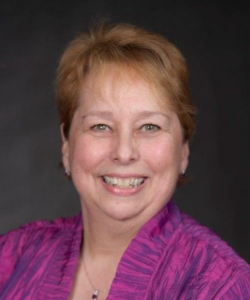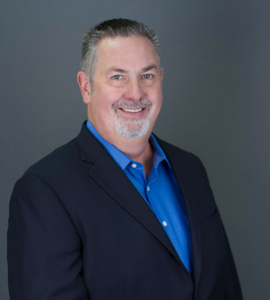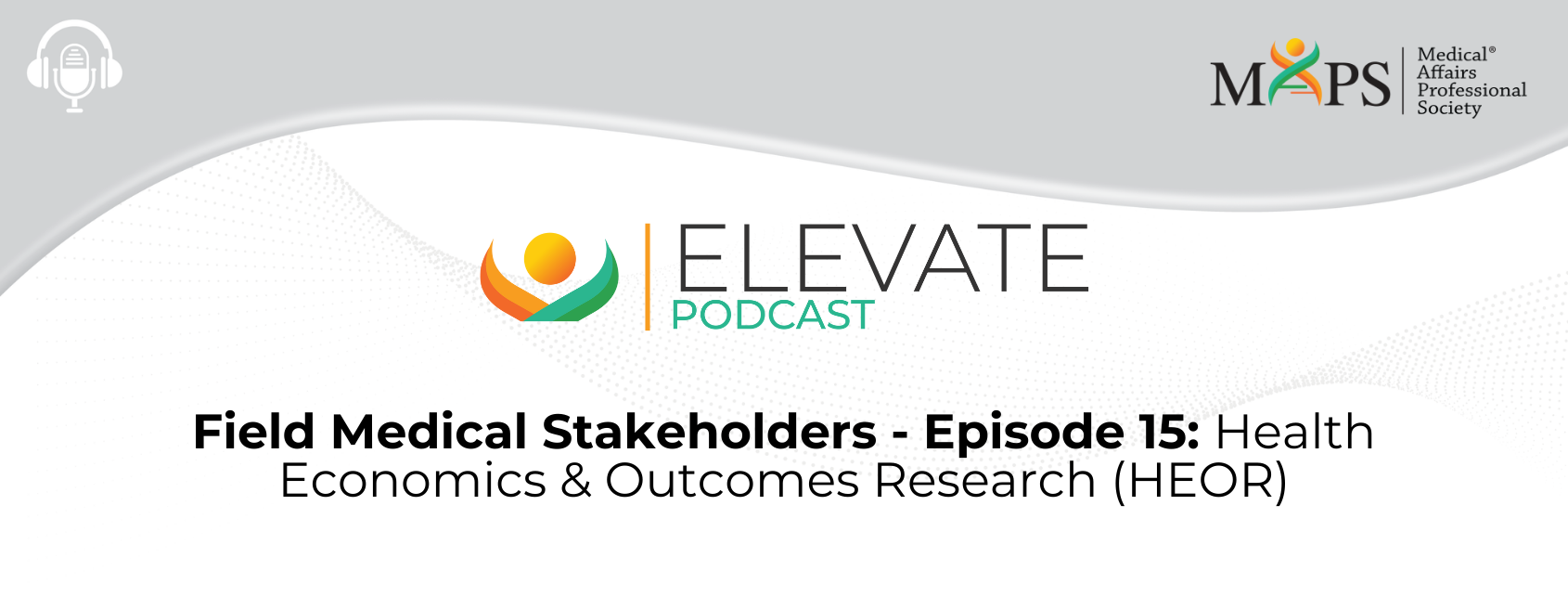Field Medical Stakeholders Partnering for Today and Tomorrow – Episode 15: Health Economics & Outcomes Research (HEOR)
Objectives
At the end of this series of podcasts, the participant should be able to:
- Discuss the functions and activities of key internal partners
- Identify potential areas for compliant collaboration by MSLs with key internal partners

MODERATOR: Kathryn Gann, PhD

INTERVIEWER: Kyle P. Kennedy

INTERVIEWEE: Shelly O. Ikeme PharmD, MPH
Following is an automated transcription provided by otter.ai. Please excuse inaccuracies.
Kathryn Gann 00:00
Welcome to the Medical Affairs Professional Society Field Medical Focus Area Working Group’s podcast series entitled, “Field Medical Stakeholders: Partnering for Today and Tomorrow.” In this 15th podcast, we will be discussing health economics and outcomes. I’m Kathryn Gann. I’m a member of the field medical focus area working group and I’ll be the moderator for this podcast. Currently, I’m an independent consultant in Medical Affairs, having spent my 30 year career as an MSL and MSL manager and an MSL trainer. Our legal disclaimer is as follows. The views expressed in this recording are those of the individuals and do not necessarily reflect on the opinions of MAPS, or the companies with which they are affiliated. This presentation is for informational purposes only, and is not intended as legal or regulatory advice. We encourage you to engage in conversations about partnering with field medical stakeholders with other MAPS members via the community portal on the MAPS website. Simply log in with the email address and password associated with your MAPS account and click on the discussion tab. Then scroll down to field medical to post a question or review previous postings. The objectives for this series of podcasts are that at the end of this series, the participant will be able to one discuss the functions and activities of key internal stakeholders and to identify potential areas for compliant collaboration by MSL with key internal stakeholders. I’d like to thank today’s panelists for sharing their subject matter expertise with the MAPS membership. speaking today are Kyle Kennedy, Vice President Customer Strategy at the Medical Affairs Company. And Kyle’s going to be our interviewer and Shelly Ikeme, Global Head of Health Economics and Market Access, which you’ll probably hear called HEMA, for Johnson and Johnson, and Shelly is our interviewee. Kyle, if I turn this over to you, could you please briefly provide us a little bit of information about yourself and your background and your current position?
Kyle Kennedy 02:10
Well, thank you Kathy. I’m currently vice president of customer strategy for the Medical Affairs company also known as T Mac. T. Mac operates as an independent business unit apart cell. I started in the pharmaceutical industry in 1988. And I’ve been in field medical arena for approximately 27 years. I’ve been both an MSL and an MSL field director, and I currently manage 10 field directors, both in the US as well as globally. I’m happy today to speak with Dr. Shelly Akemi. Shelly, how about sharing a little background of your experience in our industry?
Shelly Ikeme 02:50
Thank you so much Kyle. Thank you, Kathy. And thank you to the MAPS organization for inviting me to participate in the podcast today. As it was mentioned earlier, I am currently the Global Head of Health Economics and Market Access, I’m gonna be calling it HEMA. So I am the Global Head of HEMA for three Johnson and Johnson operating companies. Those are our current mentor and Sara Novus. I’ve been in the medical device sector part of the industry for six years now. Prior to that, I spent 10 years in farmer serving in several roles spanning safety to Medical Affairs, and that’s including in house and field. And now to HEMA, where I first served in a field row before moving fully back in house now, I am a pharmacist by academic background, went to Temple University go out. But I’ve evolved out of the traditional pharmacy role to in the industry now to take on other cross functional roles in health economics and market access after advancing my academic pursuits in public health, an MPH and a PhD in Applied Health economics from Thomas Jefferson, and that’ll be it.
Kyle Kennedy 04:07
Well, Shelly, thank you. What an impressive academic background. Can you explain to us what your job is as Global Head of health economics and market access for the Johnson and Johnson companies?
Shelly Ikeme 04:20
Sure. So as the head of global HEMA, my primary role is setting the market access strategy for the three operating companies that I support with the sole purpose of expanding patient assets. I personally don’t think that it stops at expanding patient assets. So for me getting the right treatment or procedure to the right patient is my Northern Star. Now, in executing market asset strategy, we engage in multiple tactics which differs from company to company, region to region and based most especially on the local market access needs. So on the global level, my role typically in ensures the development and shaping of sufficient evidence to meet positive appraisal requirements set by HTS, which is held technology assessment bodies. In the UK, it’s called nice in France, it’s called has on the regional level. For example, in the United States, my primary focus is making sure that all the three reimbursement levers are adequate. And that’s including coding coverage and payment downstream with deploy pull through market. So strategies such as shaping and validating the value proposition with evidence, actually generating that evidence, as well as developing the value tools that go with it. And those value tools go anywhere from your typical burden of disease to budget impact models, to cost calculators, to decision making dashboards and so on.
Kyle Kennedy 05:55
Thank you very much, Shelly, let’s focus on the health economics portion of your position with whom do you typically interact in your role both internally and externally?
Shelly Ikeme 06:08
So Good question. So internally, we engage multiple cross functional colleagues from pipeline. And within that pipeline space, you have your r&d folks, your clinical folks, epidemiology and safety, we go all the way from pipeline to launch. Within the launch space, we interact with our friends in commercial, and that’s including marketing, sales, finance, professional education, and so on. Externally with typically directly engaged with HTA bodies. So the health technology assessment bodies, mostly outside the US. In the US, we engage with payers directly, we engage with advocacy stakeholders, societies and key opinion leaders. We’ve also engaged in some very innovative indirect engagement strategies, we payers, Vir pair grassroot advocacy schemes here in the US. And this typically involves societies at the med and key opinion leaders.
Kyle Kennedy 07:05
Great, thank you for that. Another question. What are some of the tools you’ve developed within your department? For those internal and external interactions?
Shelly Ikeme 07:15
Gosh, where do I start how we’ve done it all. It’s really depending on where that device is in the in the life cycle. So typically, during pipeline phase, we’ve been focused on developing tools to inform us on the population, we’re actually targeting the economics of that population, the burden of disease in that population, and that’s including clinical and economic burden of disease. We want to know, what are the treatment patterns? What is the treatment journey, we do analysis around that? We do pricing models, pricing, analysis, value of information, analysis, and etc. Now, once we get to lunch, or during life cycle, we typically focus on different kinds of tools, right, we focus on tools for communicating the clinical and economic value proposition to both internal and external stakeholders, including the HTA, the payers, the hospital decision makers, all the way to purchasing decision makers as well as materials management in the hospital.
Kyle Kennedy 08:17
I see that makes sense, shall we? What’s your understanding of the role MSL play within health economics at your organization? Great.
Shelly Ikeme 08:28
I mean, this this is a great question a million dollar question Kyle. And this will be my personal professional looking at around that. So honestly, I’ve seen the role of the MSL has evolved in the past 15 years. I used to be an MSL myself and at the time, early to mid 2000s. I did see the primary role of the MSL just purely engaging in peer to peer dissemination of the science, you know, product clinical data dissemination to kill wells and payers. And overtime I saw that role construct a little bit slowly split in the medical liaison from the payer liaison. I’m guessing the reason why that happened was that there was an understanding that the traditional MSL was not so optimized to have that strategic engagement with C suite payers. Shortly after, he also seems that the role went through another evolution again and this time around is so more of an expansion of the scope of the MSL into medical strategy and really having a seat for the MSL on the on the table from pipeline to launch. So however, regardless of all of these evolution, if you really look at the crux of the center of who the MSO is or what their role is, it still maintains to be the liaison and the conduit between the company and external thought leader community, facilitating information and value transfer. So on that point when it comes to working with folks in HEMA, it’s, it’s I really see that role in shaping the value of it. Position shaping the evidence shaping the value tools development. So the value of the MSL is really indispensable cow as they have their ears closes to the ground with the most important customers. So the expectation for me is that the voice of the MSL is truly the voice of the customer. And to think that companies today have alarming budgets earmarked for voice of customer activities, instead of really optimizing the MSL to serve in that role in some kind of capacity is really a lost opportunity.
Kyle Kennedy 10:34
Shelly that’s very insightful, the evolution is really well put by you. Do you have any best practices to share with our maths audience on how msls can partner with their health economics colleagues?
Shelly Ikeme 10:49
Great, awesome question. So I see a great opportunity for msos to really take on that mantle of organic medical and business intelligence role in the companies that they serve. So I say that because MSL sit at the nexus of the transfer of the freshest, and the newest ideas in this in the therapeutic spaces that they serve. This sort of play a role in that whole ideation, incubation camp, very elite incubation of higher level interactions, we kill wells, so be able to soak all of that valuable information, still, and transfer that knowledge to the companies to help shape market growth and development strategies is really invaluable. However, I have to be able to say this, the challenge I see today for msos, in being very efficient in this capacity is oftentimes they’re removed from headquarter activities. They’re removed from the understanding of the priorities and the challenges of the business. So it’s it really does hamper their ability to know what exactly is business intelligence? What is meaningful to my company? What is the so wide?
Kyle Kennedy 12:02
Yeah, I agree. Shelly, one last question. Can you tell us how your career path led you to your current position as Global Head of health economics and market access for Johnson and Johnson?
Shelly Ikeme 12:14
So this is a question that I’ve mastered answering because I get it all the time, Kyle. So most people I know today who sit in HEMA, they typically come from other departments, mainly Medical Affairs, and sometimes commercial. And a lot of times, they’re this secure that opportunity, you’re on the job experience. So they go sort of this insider route. For me, even though I was already an insider, I actually stepped out and told the path of academic advancement in public health through an MPH program and applied health economics through a Ph. D. program. And that’s how I got here. But um, honestly, when I look back today, I don’t, I can’t really say that I needed all of that detour. But for me, it was personal. And I needed I wanted the personal confidence in the technical capabilities of the job. I wanted to be able to actually get my hands deep in generating data. I wanted to build economic models. I wanted to understand all the different regional health technology assessment bodies, policy shaping, global in US reimbursement, nuances, right. So there was really some dash of humanly humility in my knowing of filling that my traditional pharmacy background wouldn’t really cut it for the dose of confidence that I needed to really emboldened me to make the leap. So at the time, to be fair, I also had the support of my bosses, I communicated very clearly what my aspirational goals were, they understood that they bought into it. So as soon as I finished my my programs, my mph specifically, I made a very swift transition to field HEMA, then from field, HEMA, I came back in house and continue to progress in that space. And here I am today, I would consider myself a market assets, subject matter expertise.
Kyle Kennedy 14:19
Wow, what an impressive career. Shelly, thanks for sharing your background and roll with us today. I think the MAPS audience are going to enjoy hearing all about your organization and how you’ve gotten to where you are today. With that, I’m going to turn it back over to our moderator Kathy, who’s going to wrap it up.
Kathryn Gann 14:38
Thank you, Kyle. And thank you, Shelly. That was really very interesting, Shelly, and I’m right there with Kyle, thinking that our audience is going to be very impressed with how you have shaped your career. Considering that you have been an MSL and where you are now and what you’ve done to gain the skills and the understanding to help you grow now into the market access. Subject Matter Expert. So in line with our learning objectives, participants should now have a better understanding of the role and function of health, economics and outcomes, and also how mFl may compliantly interact with that team. To quote Shelly, the voice of the MSL is the voice of the customer. And this is very important in health economics and outcomes. So this has been the 15th podcast in a series on the topic of field medical stakeholders Partnering for today and tomorrow. If you’re a MAPS member, thank you for your support of MAPS. If you’re not yet a MAPS member and would like access to additional resources in this area, please visit the MAPS website to explore joining that website is Medical Affairs.org Ford slash membership. This concludes the podcast



